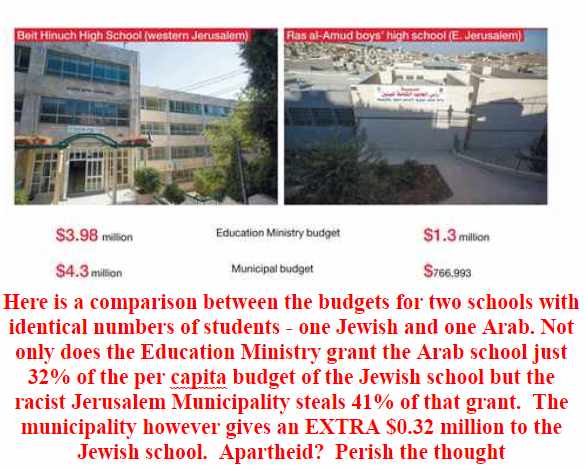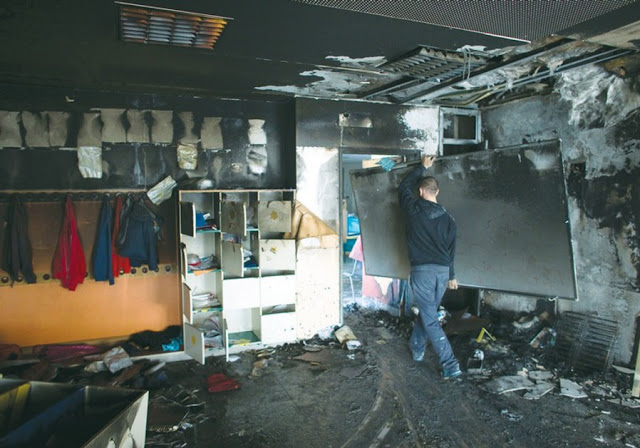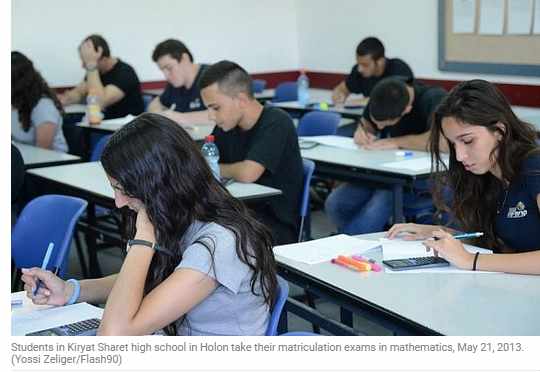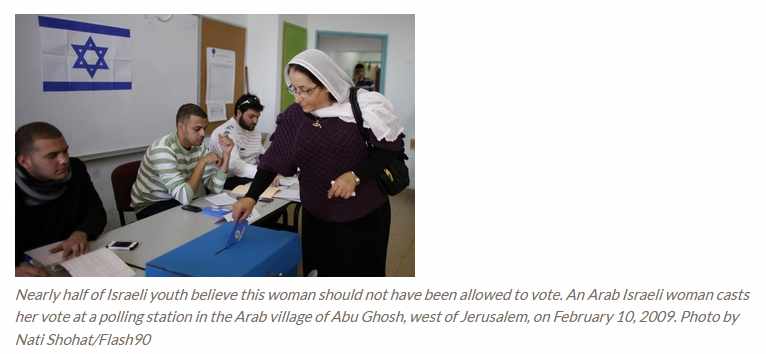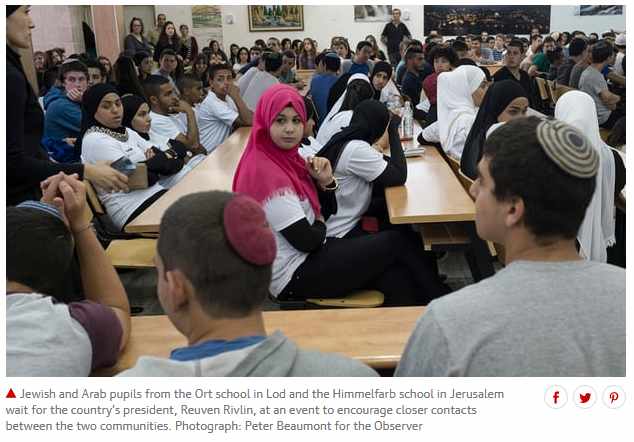What religious and
nationalist indoctrination in schools means for Israel’s future
is a common myth assiduously propagated by Israel’s supporters that whereas Israel
inculcates respect in its Education system for Arabs, the same is not true of
the Palestinian education system. A
typical example is the article by neo-conservative Elliot
Abrams for the Council on Foreign Relations entitled Teaching Palestinian Children to Value Terrorism.
Abrams writes that ‘A new study of Palestinian textbooks finds that Palestinian
children are being taught to glorify and value terrorism and violence.’ The
assumption behind this is that Palestinian resistance to the Occupation,
classified as ‘terrorism’ would not occur but for Palestinians being taught to
hate their occupier. Indeed over time Palestinians would come to love the
Occupation and the continual theft of their land, the attacks by settlers, the military
checkpoints etc. This is part of the
process of normalising the Occupation (which is never called that) and
demonising the victims. It is on a par
with the Nial Fergusson/Andrew Roberts view of British history.
But this doesn’t of course explain why Israel’s high
school students are so racist and right-wing..
Nearly half of Israel’s high school students do not believe that
Israeli-Arabs are entitled to the same rights as Jews in Israel, according to
the results of a survey in 2010. Poll:
Half of Israeli High Schoolers Oppose Equal Rights for Arabs
11.3.10.
The same poll revealed that more than half the
students would deny Arabs the right to be elected to the Knesset. At the same time 48 percent said that they
would refuse orders to evacuate outposts and settlements in the Palestinian
territories although nearly one-third – 31 percent – said they would refuse
military service beyond the Green Line.
Daniel Bar-Tal, of Tel Aviv’s School of Education was quoted as saying that “Jewish youth have not internalized
basic democratic values,”
was nothing abnormal or erratic about this poll. Almost exactly the same conclusions were
reached in another poll taken six years later which found that nearly
half of Jewish Israeli high school students believed that Arabs should not have
the right to vote.
The poll, conducted by New Wave Research for the
Israel Hayom daily, asked Jewish Israeli high school students in grades 11-12 a
variety of questions intended to probe their opinions on current affairs and
political identity. Half of Jewish high schoolers say Arabs shouldn’t vote
– poll 13.4.16.
(48%) of those polled answered “no” to the question: “Do you think Arab Israelis should be represented in the Knesset?” 52% said yes
 |
| military values are instilled in Israeli Jewish children from an early age |
to Reuven Harari, the CEO of pollster New Wave, most of the figures in the poll “were not surprising,” as they matched
numbers pollsters have found for Israeli adults. Hariri told Army Radio that
the research had two important and interconnected findings. First, youths in
Israel are more right-wing than their parents. Second, while “the trend around the world is for youth to
be more left-wing than their parents, in Israel we are special in that our
youth is more to the right of their parents.”
of those polled also said they believed medical treatment should not be given
to an injured terrorist and 82% said there was no chance at all of achieving a
peace deal, while just 18% said an agreement was possible. In addition 59% of high school students
considered themselves right-wing and only 13% identified as left-wing.
surprising. Jamal Zahalka, a member of the Knesset and
Balad demanded an investigation into the training
sponsored by the Israeli police and the education ministry, which he said “prepares students psychologically to kill
Arabs.”
their body blurred with a black marker – using a paintball gun to fire at
cutouts of men and women wearing checkered kuffiyeh headscarves that
are associated with Palestinians. See Israeli police teach schoolchildren how to shoot
Palestinians.
education system, one for Jews and another for Arabs. Arab schools get a
fraction, somewhere around a quarter per capita of the funds allocated for
Jewish schools.
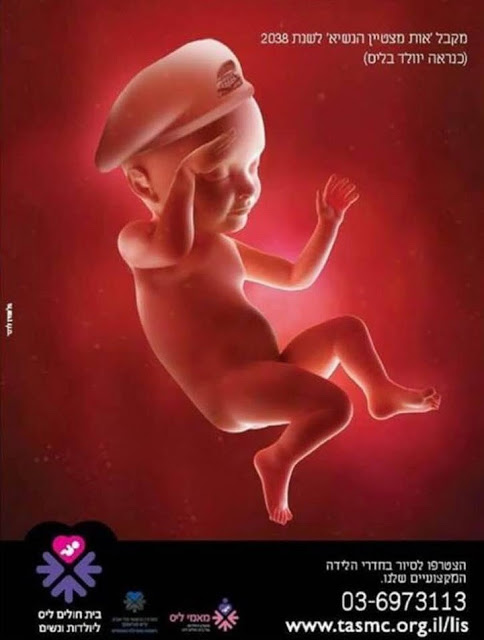 |
| Israel’s warrior baby |
Ha’aretz gave the example of two Jerusalem
schools with nearly equal numbers of children, 782
pupils in the Beit Hinuch Jewish High School in western Jerusalem and 783 in
the Ras al-Amud Arab boys’ high school in East Jerusalem. Both are municipal
high schools, meaning that their budgets come from the municipality and the
Education Ministry. The total budget allocated by the city for Beit Hinuch in
2016 is 16.3 million shekels ($4.3 million,) while the Arab school, with the
same number of pupils, will be getting only 2.9 million shekels
($766,993). In other word the Arab high school is receiving only 17%, one
sixth, per pupil compared to the Jewish school. The number of teaching
positions approved for Beit Hinuch is 70.8, while for Ras al-Amud it is only
21.7.
There are those propagandists for Israel – the Joan Ryans, Margaret
Hodges and Emily Thornberries – who still maintain that Israel is ‘the only
democracy in the Middle East’. Segregation and institutionalised discrimination is not, however, compatible with democracy. Except for a handful of mixed private schools
Jews and Arab students go to separate schools. Arab
Students in Jerusalem Get Less Than Half the Funding of Jewish
Counterparts
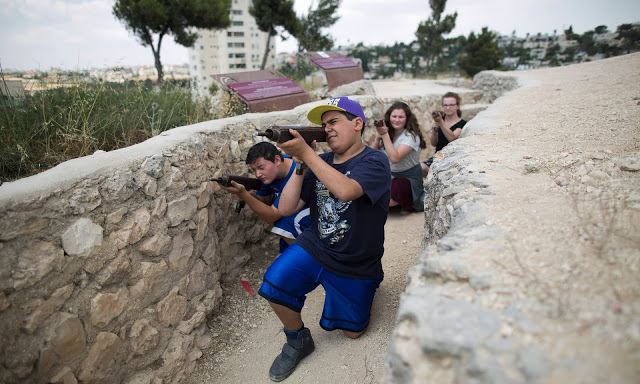 |
| Israeli youth relive mock gunbattles |
An important article Jewish and Arab pupils talk of unity, but Israel has
never been so divided by Peter Beaumont in The Guardian (4.6.16) describes
the introduction of a new civics textbook – To Be Citizens in Israel –
produced by the Education Ministry, whose Minister is Naftali Bennett a member
of the far-Right religious settlers party, Habayit HaYehudi (Jewish Home). Beaumont
described how it had been accused of editing out Israeli Arabs and their
experiences. He quoted an editorial in Ha’aretz Israel’s New Civics Textbook Was Born in Sin and Must
Be Opposed
“The book’s
message is impossible to mistake: Jewish identity, as expressed in the state’s
definition of itself and in the public sphere, takes priority over civic
identity. This mainly reflects the views of an orthodox, conservative,
rightwing strain of Judaism.
that ‘The furore over the book – which
superseded one that rightwing parties such as Bennett’s complained was too
critical of the state – has not been an isolated incident. In December,
Bennett’s ministry removed a book, Dorit Rabinyan’s Borderlife, that depicted a love story between an
Israeli woman and a Palestinian man, from the curriculum of Israeli secular state
schools.
participated in the writing of the civics book.
life between Jews and Arabs. The Jews’ rights are clear; the Arabs’ place is
restricted; and the walls separating them are only raised even higher. The
racism that is ripping Israeli society apart receives almost no mention.”
portray Israel’s education system as fostering mutual tolerance unlike the Palestinian
education sector which is seen as responsible for ‘terrorism.’
How fascism Is Creeping Into Israel’s Education
System
20, 2018 7:40 PM
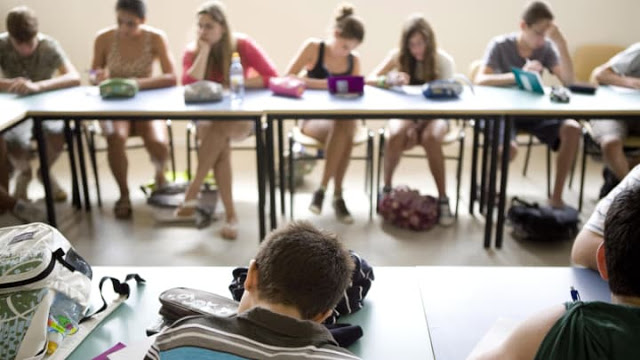 |
| An Israeli classroom (illustrative). Tomer Appelbaum |
If we look at Israel’s education system through the prism of PISA – the
Program of International Student Assessment – the situation looks bleak. Every
three years, the Organization for Economic Cooperation and Development conducts
these exams to check the skills of 15-year-old students the world over in
reading, mathematics and science. Consistently, the results for Israel suggest
that the percentage of high-school graduates who will find it difficult to
integrate into their society and economy is one of the highest among the more
than 70 countries in which the PISA surveys are conducted. The achievements of
Israel’s teachers, which the test also evaluates, also leave much to be
desired.
local education budget actually grew by 30 billion shekels (about $7 billion)
and has continued to increase apace since. But the investment of all those
billions resulted in improvements of only another 13 points in the PISA science
tests and another 28 points in math section.
students for their future, and not for our past,” says Andreas Schleicher,
coordinator of the PISA and in essence the OECD’s “minister of education,” in
regard to the low achievements in Israel. As he told Haaretz (Hebrew edition)
last month, “Pedagogy in Israel is very
traditional and standard. It is not directed toward developing the student’s
skills, it does not emphasize creative thinking and problem solving. There is
too much rote learning It doesn’t work like that anymore. In the modern world
you are not rewarded for what you know, but for what you can do with the
knowledge you have accumulated.”
the wake of an announcement by a senior Education Ministry official, in which I
wrote: “We have been informed that
henceforth part of the matriculation grade in Bible will include memorization
of verses and reciting them aloud. The goal underlying this decision by the
coordinating supervisor of Bible studies is ‘to draw the students close to the
Bible and to improve their ability to read texts aloud.’
lovely that in the age of information and technology, innovation in the
Education Ministry takes the form of placing the emphasis not on the ability to
understand a text, nor on critical thinking or even on the sheer ability to
find one’s way through the recesses of the Bible, but on the ability of Israeli
students to present an appropriate Zionist response to church choirs by chanting
a number of selected verses according to biblical cantillation.”
cultural richness was born from criticism and wonder, from disputes and from
daring, and not from memorization and reading aloud It’s essential to create intellectual
curiosity.”
In September 2016, Education Minister Naftali Bennett chose to declare, at an
event saluting the TALI (Hebrew acronym for “enriched Jewish studies”) education
fund, that,
study of Judaism and excelling in it is more important to me than the study of
mathematics and science.” Not for the first time, Bennett also rejected
criticism that was leveled at this approach. One such critique was voiced at
the time by Rachel Elior, professor of Jewish philosophy at the Hebrew
University of Jerusalem: “What is most important are studies about human
dignity, according to which the sanctity of life is universal and is not
conditional on religion and nationality.”
Bennett’s Habayit Hayehudi party ignores societal diversity and advocates
foisting a religious-Zionist (nationalist) education on all Jewish children.
The love of homeland that the party seeks to teach involves annexation of the
West Bank, continued rule over another people and the international isolation
of Israel until “we accustom the world”
to this policy. Its educational model ignores such biblical imperatives as “you shall love the stranger.” It evokes
the educational approach about which Yeshayahu Leibowitz wrote a searing
warning:
person who accepts the opinion that ‘the state,’ ‘the nation,’ ‘the homeland,’
‘security’ and so forth are the supreme values, and that unconditional loyalty
to those values is an absolute and sacred duty, will be capable of perpetrating
every abomination for the sake of that sacred interest, without any pangs of
conscience.”
nationalist-religious-messianic education, in which, it must be said, the two
previous education ministers, Gideon Sa’ar and Shai Piron, were also complicit.
According to Education Ministry data, between 2012 and 2016, the ministry
increased the per capita budget for students in state-religious high schools by
the highest percentage of all the educational streams: Totalling 33,000 shekels
(about $9,500) per student per year, the sum allotted was 22 percent higher
than that for students in the secular state education system, and 67 percent
higher than for students in Arab high schools.
youth it will be possible to influence the political system, and with it
Israel’s character and regime, in the years ahead. This insight is shared by
all of those who wish to “settle in the hearts,”and promote nationalist and
messianic ideas among the larger public.
society runs deeper: It is tainted by signs of fascism. “Anti-intellectualism”
has always been a symptom of fascism. The persecution of liberal intellectuals
for their supposed betrayal of tradition or of authoritarian ideology was an
obligation for the thinkers of the elite in such places as fascist Italy.
Discussing this, the poet and author Lea Goldberg noted that intellectuals and
creative artists pose a threat to dictatorships and to worldviews that deny
human liberty, when they (the artists) teach “humanity to say ‘no’ with bitter
derision when the time demands it.”
lecturers drawn up last year by philosopher Asa Kasher at Bennett’s request.
And MK Tzipi Hotovely, later to become Israel’s deputy foreign minister, wrote
on her Facebook page in September 2014 in reference to the creative backbone of
Israel’s high-tech industry, the engine of the growth of the country’s economy:
refusal of officers in [IDF intelligence unit] 8200 [to serve in the reserves]
is a social explosive belt and reflects the moral bankruptcy of the education
system in which they grew up. They are not worthy to serve in the world’s most
moral army. The chief of staff must start the process of their dismissal
immediately.”
“degeneration of language” that we see in many elected officials. Still, no one
even comes close to the minister of culture in this regard. All fascistic
textbooks used throughout history have made use of a minimal lexicon and the
most basic grammar, with the aim of depleting the tools for critical and
complex thinking. In a five-minute speech that then-Likud MK Miri Regev
delivered to high-school students while appearing on a panel of politicians in
2012, she asserted that Labor MK Shelly Yacimovich voted for Hadash (the
communist, Jewish-Arab party), and activist Stav Shafir (who later became an MK
from Labor) was a communist.
process that unfolds across many years – until the moment when a particular
slice of reality reflects the full force and implications of such a process.
This is not the first time the naked truth about Israel’s teachers has been
exposed. It happened two years ago, too, in the episode of the survey of
teachers regarding the history of Zionism and the Israeli-Palestinian conflict.
in September 2015 by the newspaper Israel Hayom found that 69 percent of the
country’s school teachers do not know what happened on November 29, 1947, and
57 percent do not know what the Green Line is or how it was determined. The material
that must be memorized is chosen carefully – the prayer for rain, for example,
because according to the Education Ministry this can influence rainfall – but
it does not include formative events in the history of Zionism.
determine our fate. It is the result of the fact that in recent years the
Education Ministry has been led by figures from the nationalist and
messianic-religious camp.
exacerbated mainly due to two important trends, which are instrumental in
creating the political culture and the greater social culture that exists in
the public domain.
knowledge of Israel’s major milestones – that the school curriculum will not
include certain concepts and facts, and outlines of historical processes, that
could serve as the basis for a fuller understanding of the history of Zionism
and the conflict with the Arabs. It is easier to introduce “historical truths”
into this knowledge vacuum and to change them according to various political
needs – as seen, for example, in the prime minister’s remarks about the
Jerusalem mufti Hajj Amin al-Husseini’s supposed responsibility for proposing the Final Solution to
Hitler.
messianic content into the curriculum, which Bennett manages to do
clandestinely; it’s easy and convenient when there is no other solid base of
knowledge to be contended with. This is a manifestation of the education
minister’s main mission, based on his statement that for the sake of the Land
of Israel it is necessary to change the people of Israel and the State of
Israel. He and his colleagues are now focusing on “settling in people’s
hearts,” following a series of traumas deriving from the shattering of
messianism on the rocks of reality: the Gaza withdrawal, the evacuation of the
illegal Migron and Amona outposts, and the containment of the building momentum
in the settlements as a result of international pressure.
in total contradiction to the spirit of the country’s founders. They sought to
ensure the future more than to preserve the past – as David Ben-Gurion and
Yitzhak Ben-Zvi, Israel’s second president, wrote in their 1918 book, “Eretz
Yisrael”: “If we wish to determine the
borders of the Land of Israel of today, [it is] mainly if we see it not as the
preserve of the Jewish past but as the land of the Jewish future.”
Israel will end up realizing the warning of Lord Nathaniel Rothschild, who
wrote to Theodor Herzl in August 1902,
tell you very frankly that I should view with horror the establishment of a
Jewish colony pure and simple. it would be a Ghetto with the prejudices of a
Ghetto; it would be a small petty Jewish state, orthodox and illiberal,
excluding the Gentile and the Christian.”
